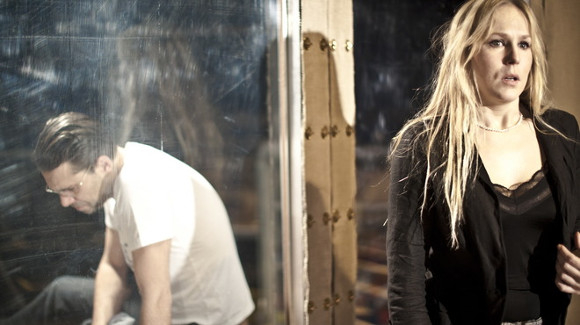Scenes From A Marriage

Coming so soon after Trevor Nunn‘s literal-minded production of Ingmar Bergman’s lacerating autopsy of a modern marriage at the St James Theatre, you might have thought that a flying visit of the Toneelgroep Amsterdam, to the Barbican with the same piece, performed in Dutch with surtitles, was superfluous to masochistic requirements.
You’d be wrong. Instead, it’s a case of experiencing a much more exciting, enthralling, imaginative and also demanding approach: over almost four hours (including one long interval) we see the intense and disintegrating relationship of Johan and Marianne in three sections, with three different pairs of actors – young, middle-aged, older – on three different sets.
So they are speaking not so much in double Dutch as in triple Dutch. And, as anyone who saw this troupe’s previous Barbican visits with The Roman Tragedies and Antonioni Project will know, the Toneelgroep under Ivo van Hove is one of Europe’s most brilliant ensembles. They have great vision and, above all, great actors. London should flock to see them… but quickly.
There was nothing wrong with the performances of Olivia Williams and Mark Bazeley at the St James; they just had to survive clunky scene changes (with more furniture than Chapel Street market on a Saturday morning) and arbitrary home movie sequences; here, the actors repeat three segments while the audiences move from one location to another – all on the huge Barbican stage – before uniting in a shared arena for the final orgiastic showdown, a babel, a battlefield and a heart-wrenching inquisition of her mother (Celia Nufaar) by her “older” daughter (Janni Goslinga).
I happened to view the three sections chronologically. But some started at the final scene, some in the middle. Each is complete in itself, and played on each side of a scenic triangle through which you can glimpse (and, more to the point, hear) the simultaneous declarations of misery, pain and disgust elsewhere.
In the first scene, a dinner party, the “ideal couple” (Suzanne Grotenhuis and Alwin Pulinckx) is regaled with a gloating magazine article by their increasingly unwelcome guests; in the second, the client with no love in her marriage – one of the greatest of Bergman’s scenes in the movie – visits Marianne (Hadewych Minis), a professional counsellor, ironically; and, in the third, a scene of grotesque truce and confession, Marianne (Goslinga) takes a tragic interest in Johan’s (Hugo Koolschijn) outrageously young new lover.
Bergman’s idea of an inescapable cycle of love and hate is theatricalised in the repetition we’re increasingly aware of as we move from one circle of hell to another. The settings are simple and uncluttered, so that when the whole caboodle flies out, we are left with the actors alone on a bare, vast stage, the auditorium looming majestically behind us like a mute witness to our shared, exhilarating discomfort.










